The Benefits of Couple Therapy: Restoring Love, Understanding, and Connection
by Alessio Faggioli - MA, BS(H), BA

Understanding Couple Therapy

Definition and Goals
Couple therapy, also known as couples therapy or marital therapy, is a type of psychotherapy designed to help couples improve their relationships. The main goal of couple therapy is to help couples better understand their relationship dynamics, improve communication, and resolve conflicts healthily.
Couple therapy is typically conducted by a licensed therapist with specialized training in working with couples. During therapy sessions, couples are encouraged to openly discuss their feelings and concerns in a safe and supportive environment. The therapist helps couples identify negative patterns of communication and behaviour, and work towards developing more positive and constructive ways of interacting with each other.
Historical Development
Couple therapy has a long history, dating back to the early 20th century. The first couple therapy sessions were conducted by psychiatrist and psychoanalyst Carl Jung, who believed that couples could benefit from exploring their unconscious feelings and conflicts in a therapeutic setting.
Over the years, couple therapy has evolved to include various approaches and techniques. Today, couple therapy is widely recognized as an effective way to improve relationship satisfaction and reduce the risk of divorce.
Overall, couple therapy can be a valuable tool for couples who are struggling with communication, conflict, and other relationship issues. By working with a trained therapist, couples can gain a better understanding of their relationship dynamics and develop the skills they need to build a stronger, more fulfilling relationship.
Identifying Relationship Issues

Couple therapy is an effective way to restore love, understanding, and connection between partners. Identifying relationship issues is the first step towards achieving this goal. Here are some common relationship issues that couples may face:
Communication Breakdown
One of the most common issues that couples face is a communication breakdown. Poor communication can lead to misunderstandings, arguments, and a lack of emotional connection. In couple therapy, partners can learn how to communicate effectively by listening actively, expressing themselves clearly, and using non-verbal cues to convey their emotions.
Trust and Infidelity
Trust is the foundation of any healthy relationship. When trust is broken, it can be difficult to repair. Infidelity is a common cause of trust issues in couples. In therapy, partners can work through their feelings of betrayal and learn how to rebuild trust. This may involve setting boundaries, being honest and transparent, and taking responsibility for one's actions.
Intimacy Challenges
Intimacy is an important part of any romantic relationship. However, couples may face challenges when it comes to physical and emotional intimacy. In therapy, partners can explore the root causes of their intimacy issues and work towards finding solutions. This may involve developing a deeper emotional connection, addressing physical concerns, and exploring new ways of being intimate.
Identifying relationship issues is an important first step towards restoring love, understanding, and connection in a relationship. With the help of a trained therapist, couples can work through their challenges and build a stronger, more fulfilling relationship.
Approach to Couple Therapy
Couple therapy is an effective way to help couples resolve conflicts and improve their relationship. There are different approaches to couple therapy, each with its benefits and limitations. One popular approach is Emotionally Focused Therapy (EFT).
Emotionally Focused Therapy
EFT is a short-term, structured approach that focuses on the emotional bond between partners. It is based on the idea that negative emotions and behaviours in a relationship are often the result of unmet emotional needs. EFT aims to help couples identify and express their emotions in a safe and supportive environment.
During EFT, the therapist helps the couple to identify negative patterns of interaction and understand the underlying emotions that drive them. The therapist then helps the couple to express their emotions in a more constructive way, which can lead to a deeper emotional connection. EFT has been shown to be effective in improving relationship satisfaction and reducing relationship distress.
EFT is based on a three-stage process:
1. De-escalation: The therapist helps the couple to identify and reduce negative patterns of interaction.
2. Restructuring: The therapist helps the couple to create new, positive patterns of interaction.
3. Consolidation: The therapist helps the couple to maintain and reinforce the positive changes they have made.
EFT can be used to address a range of relationship issues, including communication problems, infidelity, and trust issues. It is a collaborative approach that involves the couple working together with the therapist to identify and resolve their issues.
In summary, EFT is an effective approach to couple therapy that focuses on the emotional bond between partners. It can help couples identify and express their emotions in a safe and supportive environment, leading to a deeper emotional connection and improved relationship satisfaction.
Benefits of Couple Therapy
Couple therapy is a form of psychotherapy that aims to improve the relationship between couples by addressing their issues and concerns. The therapy is designed to help couples work through their problems and restore love, understanding, and connection. Here are some of the benefits of couple therapy:
Improved Communication
Effective communication is essential for any healthy relationship. Couple therapy provides a safe and supportive environment where couples can learn how to communicate more effectively. Through therapy, couples can learn how to express their needs, feelings, and concerns in a way that is clear and respectful. They can also learn how to listen actively and empathetically to their partner, which can help to build trust and understanding.
Emotional Reconnection
Couples who have been together for a long time may find that they have lost the emotional connection they once had. Couple therapy can help to restore this connection by providing a space where couples can explore their feelings and emotions. Through therapy, couples can learn how to reconnect emotionally and build a deeper, more meaningful relationship.
Conflict Resolution Skills
All relationships experience conflict from time to time. Couple therapy can help couples develop the skills they need to resolve conflicts healthily and constructively. Through therapy, couples can learn how to identify their triggers, manage their emotions, and work together to find solutions to their problems. By learning these skills, couples can reduce the frequency and intensity of their conflicts and build a stronger, more resilient relationship.
In summary, couple therapy can provide a range of benefits for couples who are struggling with their relationship. By improving communication, restoring emotional connection, and developing conflict resolution skills, couples can build a stronger, more fulfilling relationship.
The Therapy Process
Couple therapy is a form of psychotherapy that aims to help couples improve their relationship. The therapy process typically involves three stages: initial assessment, therapeutic interventions, and progress evaluation.
Initial Assessment
The initial assessment involves gathering information about the couple's relationship history, current issues, and individual backgrounds. The therapist may ask questions about the couple's communication patterns, conflict resolution strategies, and intimacy levels. The therapist may also assess the couple's mental health and identify any underlying issues that may be contributing to their relationship problems.
Therapeutic Interventions
After the initial assessment, the therapist will develop a treatment plan tailored to the couple's specific needs. Therapeutic interventions may include communication skills training, conflict resolution strategies, and intimacy-building exercises. The therapist may also use techniques from other forms of therapy, such as cognitive-behavioural therapy or emotion-focused therapy, to address individual issues that may be affecting the relationship.
Progress Evaluation
The therapist will regularly evaluate the couple's progress and adjust the treatment plan as needed. The couple will be asked to complete homework assignments and practice new skills outside of therapy sessions. The therapist will also provide feedback and guidance to help the couple maintain positive changes in their relationship.
Overall, the therapy process aims to restore love, understanding, and connection between the couple. It provides a safe and supportive environment where couples can work through their issues and improve their relationship.
Challenges in Couple Therapy
Couple therapy can be a challenging process that requires hard work and commitment from both partners. While the benefits of couple therapy are well established, there are several challenges that couples may face during the therapy process.
Resistance to Change
Another challenge in couple therapy is unequal participation. One partner may be more willing to participate in therapy than the other, or one partner may feel that they are doing all the work while the other is not putting in enough effort. This can lead to feelings of frustration and resentment and can make the therapy process less effective. Therapists need to address these issues and work with both partners to ensure that they are both fully engaged in the therapy process.
External Influences
External influences can also pose a challenge in couple therapy. These can include factors such as financial problems, work stress, or family issues. These external factors can impact the couple's ability to engage fully in therapy and can make it more difficult to achieve the desired outcomes. Therapists need to be aware of these external influences and work with couples to find ways to manage them effectively.
In summary, couple therapy can be a challenging process, but the benefits of restoring love, understanding, and connection are well worth the effort. By addressing challenges such as resistance to change, unequal participation, and external influences, therapists can help couples overcome these obstacles and achieve their therapy goals.
Success Factors for Therapy
Couple therapy is a valuable tool for restoring love, understanding, and connection in a relationship. However, the success of the therapy depends on several factors. Here are some of the key success factors for therapy:
Therapist's Competence
The competence of the therapist is crucial for the success of the therapy. A competent therapist should have the necessary training and experience in couple therapy. They should have a good understanding of the different approaches to couple therapy and be able to adapt their approach to suit the needs of the couple. The therapist should also have good communication skills and be able to create a safe and supportive environment for the couple.
Couple's Commitment
The couple's commitment to the therapy is another important success factor. The couple should be willing to work together to improve their relationship and be open to the therapy process. They should be willing to make changes and be actively involved in the therapy sessions. The couple should also be committed to attending all the therapy sessions and completing any homework assignments given by the therapist.
Adaptability of Therapy Method
The adaptability of the therapy method is also an important success factor. The therapist should be able to adapt the therapy method to suit the needs of the couple. The therapist should be able to identify the strengths and weaknesses of the couple and use this information to tailor the therapy approach. The therapist should also be able to adjust the therapy approach as needed throughout the therapy process.
In summary, the success of couple therapy depends on the competence of the therapist, the commitment of the couple, and the adaptability of the therapy method. By considering these success factors, couples can increase their chances of success in couple therapy and restore love, understanding, and connection in their relationship.
Case Studies and Testimonials
Couple therapy has been proven to be an effective way to restore love, understanding, and connection in relationships. Case studies and testimonials show how it can help couples overcome a variety of challenges and improve their overall well-being.
Rebuilding After Infidelity
Infidelity can be devastating to a relationship, but couple therapy can help couples rebuild trust and intimacy. In a case study published in the book "Emotionally Focused Couple Therapy with Trauma Survivors," a couple was able to work through the aftermath of infidelity with the help of a therapist. The therapist helped the couple identify the underlying issues that led to the infidelity and develop strategies to rebuild trust and intimacy. Through the therapy sessions, the couple was able to restore their connection and strengthen their bond.
Navigating Financial Strains
Financial strains can put a significant strain on a relationship, but couple therapy can help couples develop strategies to manage their finances and reduce stress. In a case study published in the book "Helping Couples Change: A Social Learning Approach to Marital Therapy," a couple was able to work through their financial issues with the help of a therapist. The therapist helped the couple identify their financial goals and develop a budget that worked for them. Through the therapy sessions, the couple was able to communicate more effectively about money and reduce their financial stress.
Overcoming Communication Barriers
Communication is key to a healthy relationship, but communication barriers can cause significant problems. Couple therapy can help couples identify and overcome communication barriers to improve their relationship. In a case study published in the book "Getting the Love You Want: A Guide for Couples," a couple was able to work through their communication issues with the help of a therapist. The therapist helped the couple identify their communication styles and develop strategies to communicate more effectively. Through the therapy sessions, the couple was able to improve their communication and strengthen their relationship.
Overall, case studies and testimonials show that couple therapy can be an effective way to restore love, understanding, and connection in relationships. By identifying underlying issues, developing strategies, and improving communication, couples can overcome a variety of challenges and improve their overall well-being.
Resources and Further Reading
Books and Articles
Couple therapy is a valuable resource for couples who are struggling to restore love, understanding, and connection in their relationship. There are many books and articles available that can help couples understand the benefits of couple therapy and how it can help them improve their relationship.
One of the most highly recommended books on the topic is "Emotionally Focused Couple Therapy with Trauma Survivors: Strengthening Attachment Bonds" by Susan M. Johnson. This book explores how trauma can impact a couple's relationship and how emotionally focused couple therapy can help restore attachment bonds and improve communication.
Another great resource is "Getting the Love You Want: A Guide for Couples" by Harville Hendrix. This book provides couples with practical tools and exercises to help them improve their communication and deepen their emotional connection.
For those looking for articles on the topic, "Counseling Couples in Conflict: A Relational Restoration Model" by James N. Sells is a highly recommended read. This article explores the use of a relational restoration model in couple therapy and how it can help couples rebuild their relationship.
Overall, there are many resources available for couples who are looking to improve their relationship through couple therapy. By reading books and articles on the topic, couples can gain a better understanding of the benefits of couple therapy and how it can help them restore love, understanding, and connection in their relationship.
Couple therapy in Prague
As an English-speaking couple therapist based in Prague, I bring a wealth of experience and qualifications to my practice. My training in Ireland has equipped me with the necessary credentials to practice as an accredited Irish psychotherapist and an accredited Czech psychotherapist. I hold a Bachelor of Arts (Honours) in Counselling and Psychotherapy from Ireland, and a Master in Psychology from the University Unimarconi in Italy. My specialized training in couple therapy from the Gestalt Institute of Ireland has further honed my approach to helping couples navigate their relationship challenges and achieve a deeper level of understanding and connection.
Couples counselling has been a central focus of my career, and I am passionate about empowering couples to recognize their untapped potential and move beyond obstacles that hinder their growth. While the process of change can sometimes be challenging, it is immensely rewarding to witness couples rediscovering their love and fulfilling their shared dreams.
